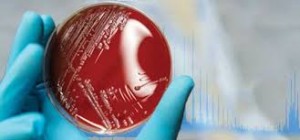Clinical microbiology is the field of medical microbiology, which study microbial diseases in somatic departments of all specialties. Clinical microbiology studies the molecular bases and the pathogenic agents of infectious diseases for the development of new diagnostic technologies and new therapeutic treatment. The procedures are different than those in other areas of laboratory,
Bacteria are the oldest and the most adaptable forms of life on Earth. They have existed for some 3.5 billion years. In clinical cases, to prescribe a correct antibiotic treatment; In samples, identification of pathogenic organisms is determinant. The identification techniques must be as much rapid and accurate as possible, to determine the origin of the community-acquired or nosocomial infections, to block the transmission of diseases between individuals, the emergence of a new hypervirulent or drug-resistant strains.
 In clinical microbiology, definitive identification relies on: Microscopy, Growth and Biochemical characteristics, Immunologic tests, Molecular techniques and bacteriophage typing. For collection of specimens, numerous methods are used and the choice of method depends upon on the specimen. In growth and biochemical characteristics, techniques used depend on the nature of pathogens. For some pathogens, the culture based techniques have limited use. Viruses are identified by isolation in living cells, immunodiagnostic tests and molecular methods and replication in culture is detected by cytopathic effects, hemadsorption.
In clinical microbiology, definitive identification relies on: Microscopy, Growth and Biochemical characteristics, Immunologic tests, Molecular techniques and bacteriophage typing. For collection of specimens, numerous methods are used and the choice of method depends upon on the specimen. In growth and biochemical characteristics, techniques used depend on the nature of pathogens. For some pathogens, the culture based techniques have limited use. Viruses are identified by isolation in living cells, immunodiagnostic tests and molecular methods and replication in culture is detected by cytopathic effects, hemadsorption.
Rapid methods of identification are manual biochemical systems, mechanized or automated systems, and immunologic systems. Molecular methods and analysis of metabolomic products are done by genomic fingerprinting.
Bench work is the most important component in diagnostic microbiology. Typical tasks include logs in sample or specimen noting date, time and tests to be performed based on quantitative growth patterns and their effective reporting.
In the twenty-first century, the clinical microbiology laboratory plays a vital role in optimizing the management of infectious diseases and surveying local and global epidemiology.
